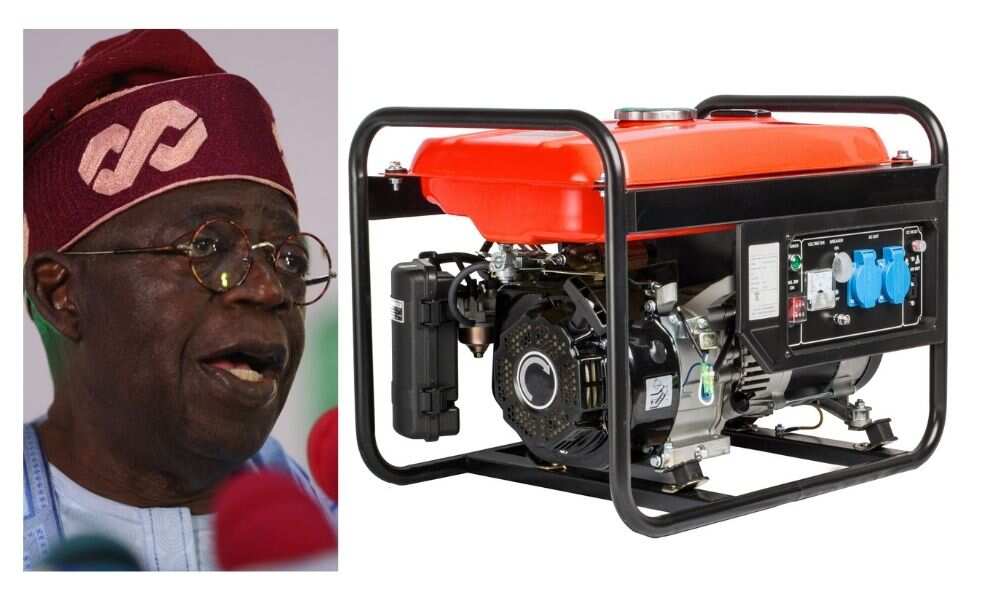Generator sales in Nigeria sharply decline once fuel subsidies are removed, according to traders
Following President Bola Tinubu's statement on May 29 that fuel subsidies will expire, a recent poll by Nairametrics found a significant fall in the sales of gasoline generator sets in Nigeria.
According to the poll, which included the main generator markets in Lagos, sales for all generator dealers fell significantly over the past month, with the majority of them unable to sell more than half of their regular stock.
Market participants have expressed alarm due to the clear connection between this unexpected sales decline and the recent rise in fuel prices.
Dealer Paul Dike of Alaba International Market's electrical area said that the rise in gasoline prices has had a direct impact on sales.
at an effort to save costs, even store owners at the Alaba market have resorted to pooling their resources to produce electricity using large diesel generators.
He said that the majority of the generators that Alaba merchants import are currently being sent to northern Nigeria or nearby West African nations.
This change is the result of the fact that many Nigerians are finding it harder and harder to pay the escalating cost of petrol. Instead, they are using alternatives to power their homes, such solar panels.
The demand for generators has decreased as a result of several locations in Lagos and eastern Nigeria reporting improved power availability over the past two months.
At the Lagos Trade Fair, Samuel Chikeleze, a key generator importer, bemoaned a sharp decline in business.
In the past, he imported two or three containers of generator sets, which he would sell in a month.
However, he has had trouble selling even one container in the past month. According to Chikeleze, consumers in Lagos appear to be less interested in buying generator sets, with the majority of sales currently taking place in northern Nigeria or neighboring nations.
The sale of generators is being negatively impacted by the high cost of fuel.
"People simply aren't coming here to buy as much as they used to. Buyers in Lagos merely appear to be on holiday. The majority of our sales currently go to either the country's northern region or its neighboring nations. We generator vendors are certainly feeling the effects of the rising cost of fuel.
Similar thoughts were expressed by Gozie Nwachukwu, a merchant in Ogba, Lagos. He claimed that it seems like people are no longer excited about purchasing fuel generators.
He pointed out that while business had previously been booming, it has drastically decreased in recent weeks as a result of the high price of fuel. He continued by saying that many Nigerians are unable to afford gasoline, which reduces the amount of time they use their generators.
I can't spend N2,500 on petrol that will only be used for four hours. How frequently will I do that each month when I need money to feed my family? George Orsu, a resident of Surulere in Lagos, remarked, "Let the generator rest for the time being.”
Households affected by the fuel price increase were also contacted by Nairametrics, and they verified that the increased cost of gasoline has made it less appealing for them to operate their generators.
A resident of Surulere, Lagos, named George Orsu revealed his predicament, saying that paying such high petrol prices puts a strain on his family's resources. He highlighted that running a generator should not take precedence over paying for necessities.
Moses Egwu, a different citizen of Alimosho Local Government Area, claimed that running a generator is the furthest thing from his mind because of how expensive living has become.
Egwu promised, "I'll make sure my rechargeable lights are always charged, no more, no less.
He admitted to Nairametrics that his wife no longer prepares meals for the week since the family can no longer withstand the danger of losing a pot of soup in the case of a week-long power outage because he can no longer afford the cost of powering his generator.
Numerous fueling station owners claim that a sharp decline in the number of people coming to purchase fuel in jerry cans confirms the trend.
The operators of Eterna, Mobil, and Total filling stations in the Lagos neighborhoods of Alimosho and Ikeja told Nairametrics that there has been an overall decline in the number of people visiting their locations to fill up their jerry cans.
The survey also found that generator repairers are seeing a loss in business as a result of the decline in generator usage.
Sodiq, a generator repairman who operates close to Adeoni Estate on the Berger axis on the outskirts of Lagos, claimed that he no longer receives many customers. To make ends meet, Sodiq works most of the day at the Okada company.
In Igando, Lagos, Chinagorom Okoye, a fellow generator repairman, had a similar story.
He admitted to Nairametrics that recent weeks have been difficult for business, particularly with the rise in fuel prices. He claimed that in these times, he scarcely has enough money to feed his family.
Previously, he would bring up to N10,000 home after a long day of work, but over the past month, he has barely brought more than N2,000.
A rise in poverty could result if the current tendency keeps up. According to Brian Amonu, managing director of Data Analytics and Solutions Nigeria Limited, 40 percent of Nigeria's 50 million houses use generators for some of their electricity.
A significant decrease in generator use could endanger the employment of many repairers, as there are an estimated 20 million generator sets that occasionally need maintenance.
The government and stakeholders may need to address the potential economic repercussions and explore solutions to lessen the burden on Nigerians and businesses that depend on generators as the country deals with the effects of the elimination of fuel subsidies.

